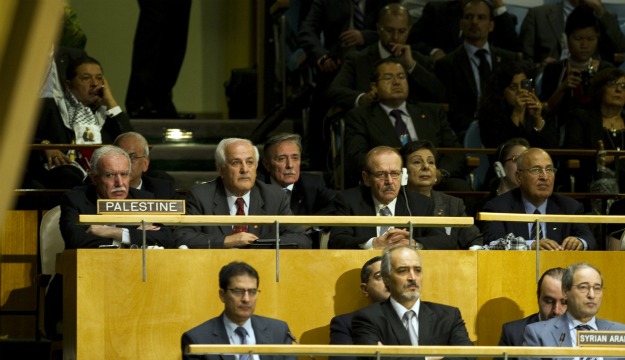UPDATES
Leaked UN report reveals cognitive dissonance on Palestinian statehood
November 10, 2011 | Daniel Meyerowitz-Katz

Just after the Palestinian Authority admitted that they are not going to win the votes needed to secure UN Security Council recognition as a state, a report prepared for the Security Council on the subject has been leaked to the media. The report, written by the UN’s Committee For the Admission of New Members, has has been leaked to American Arabic news network Al Hurra and published by Foreign Policy’s Colum Lynch. The general impression from the report is that the Committee was unable to determine whether or not Palestine can qualify for statehood, but there were a few points that were a little curious.
For starters, see if you can pick what stands out from the following paragraph.
7. It was stated that the Committee’s work should not harm the prospects of the resumption of peace talks, particularly in light of the Quartet statement on 23 September 2011 that had set out a clear timetable for the resumption of negotiations. Similarly, it was also stated that the prospect of negotiations should not delay the Security Council’s consideration of Palestine’s application. In addition, It was stated that Palestine’s application was neither detrimental to the political process nor an alternative to negotiations. Concerns were raised in relation to Israel’s continued settlement activities, which were considered illegal under international law and were an obstacle to a comprehensive peace.
The paragraph seems to be discussing the intended timetable for the Security Council’s decision and the resumption of negotiations, when a reference to Israeli settlements appears from left field. The inclusion of that sentence at the end of this paragraph comes across as a tokenistic reference to a UN pet hate; it illustrates the shameless opportunism of a body embedded with various permanent bureaucratic elements whose job it is to take shots at Israel wherever possible.
The Hamas rulers of Gaza emerged in the report as the strongest argument against Palestinian statehood. A basic requirement of statehood is a monopoly on power – a state cannot exist with multiple governments. As the Committee noted, 40% of the Palestinian population lives under the control of Hamas.
12. With regard to the requirement of a government, the view was expressed that Palestine fulfilled this criterion. However, it was stated that Hamas was in control of 40 percent of the population of Palestine; therefore the Palestinian Authority (PA) could not be considered an effective government. However, it was stressed that the PLO, and not Hamas, was the legitimate representative of the Palestinian people. [emphasis added]
That the PLO and not Hamas is the legitimate representative of the Palestinian people should be seen as an exercise in wishful thinking rather than actual analysis – they did win a majority of seats in the ill-fated 2006 elections. The PLO is more the UN’s preferred representative of the Palestinian people than necessarily the legitimate one.
The decision not to recognise Hamas as an authority in Palestine has repercussions in the decision making process, as evidenced by this paragraph:
16. Questions were raised as to whether Palestine was indeed a peace-loving state, since Hamas refused to renounce terrorism and violence, and had the stated aim of destroying Israel. Reference was made, on the other hand, to the Advisory Opinion of the ICJ on Namibia of 1971, which stated that the only acts that could be attributable to a State were those of the State’s recognized authority. [emphasis added]
According to their reasoning therefore, the Committee’s decision that Hamas is not a representative authority of the Palestinians, in spite of the fact that it controls 40% of the population and was voted into power by the Palestinians, means that the group’s ongoing commitment to a violent struggle against Israel is not factored into the question of whether or not Palestine is “peace-loving”.
It beggars comprehension that the Committee would simply gloss-over the fact that the government of one of the two Palestinian territories, home to almost half the Palestinian population, was firing missiles into civilian areas as the Committee was deliberating – hardly the hallmark of a “peace-loving” state.
This report exposes how political affiliations and ideological solidarity continue to trump both reason and common sense in the way that the international community deals with the Israelis and Palestinians.
Daniel Meyerowitz-Katz
Tags: Palestinians





